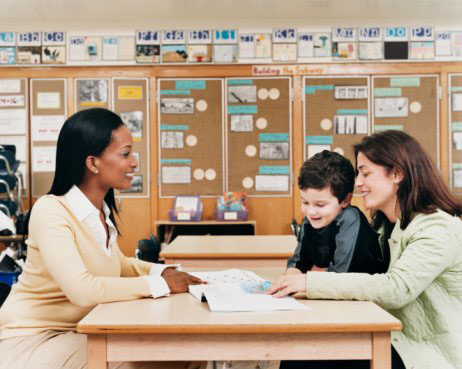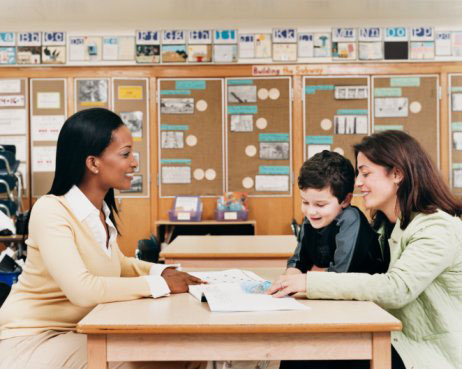
by PRIDE Reading Program Admin | Mar 20, 2016 | A PRIDE Post, IEP
The single most important source of information on your child’s progress is the classroom teacher. The teacher talks with you after school, at the IEP meeting, and at consistently scheduled conferences. The teacher completes your child’s progress reports and corresponds back and forth with you. The teacher talks with the school psychologist, the physical therapist, the speech and language therapist, the resource specialists and administrators about your child’s needs and progress, and then the teacher communicates with you.
The abundance of information between you and the teacher will depend mainly upon your relationship with one another. If the teacher perceives you as a proactive parent who also understands the needs and problems of a teacher, and if you believe the teacher can teach your child effectively, you will probably receive plenty of up-to-date, specific information about your child’s progress. But how do you as a parent develop this cooperative relationship with your child’s teacher? You may wish to try some of the following suggestions:
- Try to develop a personal relationship with your child’s teacher. Let the teacher know that you are working together with them as a partner in educating your child.
- Give the teachers and specialists sufficient time to get to know your child before asking their opinions about your child’s progress, problems, the appropriateness of the program, and so forth.
- Let the teachers and specialists know you understand the difficulties they frequently face in doing their jobs – be empathetic to their needs, too!
- Prepare for conferences in advance by developing and bringing with you a list of questions, concerns, and comments. This saves everybody time and ensures that nothing important will be overlooked.
- Let teachers and specialists know what is important to you in the education and development of your child.
- Discuss and share your plan for monitoring your child’s IEP, and follow through with that plan.
- Discuss problems you believe have arisen in implementing the IEP with the teachers and specialists involved. Don’t begin by going right to the school administrators.
- Consider ways you might volunteer time or materials for the classroom.
As these relationships are developed and strengthened, you will experience more and more confidence in your ability to know and understand your child’s progress and the extent to which her IEP is actually being implemented.
_________________________________________________________________________________________________________
Karina Richland, M.A. is the Founder and Director of PRIDE Learning Centers, located in Los Angeles and Orange County. Ms. Richland is a certified reading and learning disability specialist. Ms. Richland speaks frequently to parents, teachers, and professionals on learning differences, and writes for several journals and publications. You can reach her by email at karina@pridelearningcenter.com or visit the PRIDE Learning Center website at: www.pridelearningcenter.com

by PRIDE Reading Program Admin | Mar 7, 2012 | A PRIDE Post, Parent-Teacher Conference
Finally, you have a chance to sit down face-to-face with your child’s teacher. You have a lot that you want to talk about, and a limited amount of time. The better prepared you are going into the meeting, the more beneficial the meeting will be for both you and the teacher. Here are some questions you can think about and then ask your child’s teacher at the next upcoming conference to elicit information and make the rest of your child’s year more successful.
How is my child doing keeping up in class?
Start out by asking the teacher how your child is doing overall. Is he or she ahead, behind, or right on target indicated by grades compared with the average student at the national level? You might want to gain information about this level your child is at. Also ask the teacher if she or he feels that your child will remain at this level- and why.
What information and skills will my child be expected to accomplish by the end of the year?
All children, whether struggling, average, or gifted need to meet higher academic standards and expectations in school. Ask the teacher what your child will have mastered by the end of the school year in reading, math, science and social studies. If your child has already achieved those goals, ask the teacher if there are more challenging academic standards in place in this classroom. If the teacher answers “yes” then ask to please see these. If your child is struggling with the coursework then discuss with the teacher what specific remediation and support is your child receiving. Again ask to see the specific program and what is actually taking place to assist your child in progressing forward.
How are you assessing and monitoring my child’s progress?
Your child needs to be evaluated and monitored during the entire school year to determine progress, remediation needs and advancement of subject areas. During your conference ask your child’s teacher what kind of information he or she is using to evaluate your child and how often these assessments are conducted.
As a parent, what can I do at home to stay involved in my child’s academic progress?
Studies have shown that children who receive regular educational support and encouragement at home do better at school and tend to excel beyond the average.
All teachers welcome and encourage parental involvement, so now is the time to ask how you can help your child at home improve his or her areas of weakness and build on his or her strengths. Ask your child’s teacher to recommend some outside enrichment activities to support his or her learning aside from home and school.
Does my child have friends?
Academics are not the only subjects you will want to discuss with your child’s teacher. Find out how well your child interacts with others, participates in groups and shows value and respect to the teacher and classmates. Talk to the teacher about what you can do to reinforce these qualities, along with what academic lessons you can teach at home to help your child become a more well rounded person.
At the end of the meeting you will want to clarify and summarize all the points discussed during the conference. This way both you and the teacher are better able to develop a mutual understanding and agreement.
_________________________________________________________________________________________
Karina Richland is the Founder and Director of Pride Learning Centers, located in Los Angeles and Orange County. Ms. Richland is a certified reading and learning disability specialist. Ms. Richland speaks frequently to parents, teachers, and professionals on learning differences, and writes for several journals and publications. You can reach her by email at karina@pridelearningcenter.com or visit the Pride Learning Center website at: www.pridelearningcenter.com


